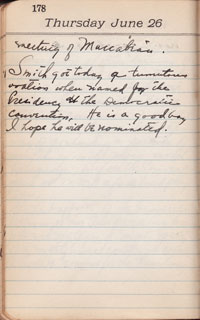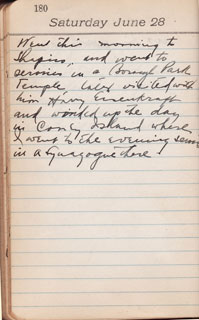
This is an idle day so I
went to the Yankee Stadium
but I regret going there because
the Yanks lost the doubleheader
My appointment with the
unknown girl I had to postpone
I was not in the mood to get
aquainted with a girl for mat-
rimonial purposes, so I called
up, and asked to be excused.
In evening Julius dropped
in and together we went to
5th ave, which presented a
magnificent view with its
brilliant illuminations and
buntings in honor of the
Democratic Convention.
———————–
Matt’s Notes
Papa has never been too enthusiastic about meeting women expressly for “matrimonial purposes.” He’s avoided such introductions before and has shown a marked indifference toward the exertions of his local shadchan, or matchmaker, who probably set up the date Papa canceled today. Perhaps the Yankees’ lackluster effort against the Washington Senators left him too uninspired to socialize; according to the New York Times, they “played with all the enthusiasm and bubbling spirits of a man being led to the electric chair. The title holders have lost all their sunshine and ginger, and their heads are down.” (The contrastingly “snappy” Senators, who climbed over the Yankees and into first place with their double victory, would go on to win the American League Pennant and the World Series in a few more months.)
It’s also hard to imagine Papa mustering the energy for small talk after his dramatically solitary excursion to Coney Island the day before. New York is terribly indifferent, and can even seem deliberately scornful, to the lost and lonely, and Papa’s encounter with the “gay throngs” and sea of happy couples on the Boardwalk made him feel as alien as when he first arrived in America. The loss of his father weighed heavily on him still, and he felt, keenly, his inability to understand the language of happiness, to participate in the culture of contentment. He felt uncared-for and unwelcome.
Perhaps that’s why he so enjoyed the spectacle of New York’s preparations for the 1924 Democratic Convention, as they were deliberately designed to make the City seem a little more hospitable and safe to strangers. This seemed, in fact, to have been the chief concern of the Convention’s organizers, as evidenced by the rather defensive essay about “The Wonder City” in the “1924 Democratic Convention Official Program”:
New York is at once the most magical and the most misunderstood city in the world. It is probably more worshiped, feared, praised, slandered, loved and hated than any other city of all time.
The trouble is that although New York welcomes visitors, tries to make them feel at home, and offers them every possible facility for enjoyment and profit, it has not yet found a way to let all the people of the country know these things.
An Undeserved ReputationNeedless to say New York is one of the world’s greatest playgrounds, providing every imaginable form of recreation and amusement of the visitor. In this respect it has gained a certain sort of reputation that is entirely undeserved. Despite all that has been said and written to the contrary, New York is morally one of the cleanest cities in the world, and the great majority of its theatres, cabarets, dance halls and other places of amusement are above reproach in this respect.
It consists of five boroughs: Manhattan, Bronx, Brooklyn, Queens and Richmond.
Alas, New York’s “cabarets and dance halls” no longer play much of a part in New York life (there are dozens of “Chinese Restaurant and Cabaret” ads in the 1924 Convention Program along with many thinly-veiled ads for the very sorts of amoral diversions that surely would have horrified Convention delegates) and Presidential political conventions are no longer intriguing or meaningful. It’s hard to imagine today, but as the convention neared, Papa had no idea who the Democratic nominee would be (former Wilson Cabinet member William McAdoo was looking strong) whether the Democratic platform would condemn the Ku Klux Klan, call for a change in Prohibition laws, or embrace the League of Nations.
Fortunately, there would be a new way for Papa to monitor the goings-on in 1924, as a Brandes radio ad in the Convention program enthusiastically pointed out:
Radio Reception more perfect this summerTremendous improvement in sending and receiving combine with better programs to provide the best of radio fun!
This is indeed a radio summer! The vital interest of the Presidential campaign — waged right in your own home. The glorious and inspiring church services. The important sporting events, market reports, home hints, intensely interesting talks, gay music — all these diversion are brought directly to you.
Why sending is better.Last summer many high power broadcasting stations operated on a single wave length. This summer they are spread over a wave band. You may choose at your will. Sending stations have greatly increased their power and are spreading their programs over many more miles. Broadcasting from interconnected stations includes many people who would formerly have been deprived of the unlimited pleasures of radio.
Stay tuned.

————
Image Source: “Interior of Madison Square Garden, New York City, prepared for the Democratic National Convention with bunting and chairs.” Library of Congress #LC-USZ62-113345
—————–
Update 6/24
A couple of New York Times articles (“New York Becomes Best ‘Small Town'” and “City in Best Dress as Company Comes”) describe New York’s incongruously hospitable atmosphere on the eve of the Democratic Convention, and also devote lots of space to the Fifth Avenue (apparently nicknamed “Avenue of the States” for the occasion) decorations that Papa and his friend Julius checked out in the evening. Looks like there had been a parade on Fifth earlier in the day, and the streets “brilliant illuminations and buntings” drew quite a crowd:
Fifth Avenue, from Madison Square up to the Plaza and Fifty-ninth Street where is the court of honor, was glowing last night with the orange, white and blue lights that form a continuous string for the whole distance. In clusters on the pylons that hold the strings of lights are flags of the nations and of New York and the seal of the State honored in each block.
Many visitors inqure the meaning of the orange, white and blue combination. Any New Yorker can answer them that these are the colors of his city. It was remarked yesterday that, if the Hylan Administration’s fondness for parades and pageants has done nothing else, it had at least let in all the sundry citizens on the secret of the civic colors.
And:
New Yorkers are traditionally curious about trifles and negligent of major spectacles. A few compressed-air drills and a couple of steam shovels digging a hole in the rock foundation of our city can draw a crowd of three or four hundreds at any time and anywhere, but when there is a big show New York passes by on the other side.
New York didn’t do that yesterday, however. When residents of this city stand on the curb for two hours waiting to see the beginning of a parade, or sit for three hours perched precariously in windows along Fifth Avenue waiting for a parade to go by, it is a sign of changing times and changing habits. New Yorkers, most of whom came originally from small towns, are reverting to type, ad least for the period of this convention.
Papa was, of course, from a small town himself, but I hadn’t considered that as a source of his fascination with the Convention spectacle until I read this article. I tend to see such events, when they come to town, as little more than necessary annoyances (or, in the case of the 2004 Republican Convention, grotesque, surreal invasions) but maybe I’m just a grouch.







 We do know the locations of
We do know the locations of 

 So, when Papa listened to the Democratic balloting, he was part of a fascinating cultural experiment in which ordinary Americans got their first intimate look at the quirks of their Presidential nominating system. (The Republican Convention had also been broadcast on the radio, but offered few surprising details since incumbent President Coolidge won the nomination handily; Will Rogers said “it could have been done by postcard.”1) Nowadays we can get all the parliamentary discord we can handle, but Papa’s dismayed tone when he writes “they seem to enjoy killing time in balloting so many times for a candidate,” gives us some idea of how odd such a live spectacle must have been. Presidential politics would, of course, never escape such attention again. Papa was really witnessing the true start of broadcast media’s role in national politics, and more broadly the modern era in which national celebrity and media savvy would become prerequisites for political success.2
So, when Papa listened to the Democratic balloting, he was part of a fascinating cultural experiment in which ordinary Americans got their first intimate look at the quirks of their Presidential nominating system. (The Republican Convention had also been broadcast on the radio, but offered few surprising details since incumbent President Coolidge won the nomination handily; Will Rogers said “it could have been done by postcard.”1) Nowadays we can get all the parliamentary discord we can handle, but Papa’s dismayed tone when he writes “they seem to enjoy killing time in balloting so many times for a candidate,” gives us some idea of how odd such a live spectacle must have been. Presidential politics would, of course, never escape such attention again. Papa was really witnessing the true start of broadcast media’s role in national politics, and more broadly the modern era in which national celebrity and media savvy would become prerequisites for political success.2